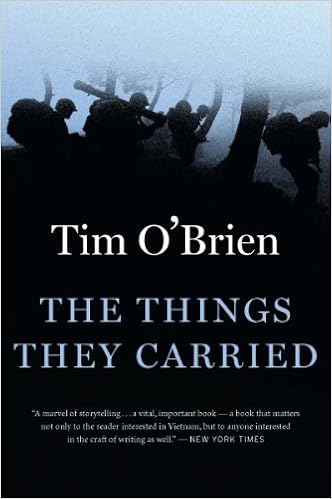O'Brien has put together a collection of short stories that are connected by the characters so that it almost feels like a novel, with him as the narrator. The cast of character include: Rat Kiley the medic who has a way of telling a story that makes you wonder how much was truth; Mitchell Sanders who believes every story has a moral to it; Kiowa, the Native American who carried a New Testament Bible with him everywhere along with his grandfather's hatchet; and the First Lieutenant Jimmy Cross, their leader, who took every death personally, blaming himself.
My favorite story was "The Things They Carried" which describes the things they carried such as "P-38 can openers, pocket knives, heat tabs, wristwatches, dog tags, mosquito repellent, chewing gum, candy, cigarettes, salt tablets, packets of Kool-Aid, lighters, matches, sewing kits, Military Payment Certificates, C rations, and two or three canteens of water." But it goes much deeper than that to the letters they carried from back home to the pain they carried, both physical and mental, to having to carry each other and above all carrying the land around them. It's a powerful story told with simplicity.
Tim received his draft notice on June 17, 1968, and a lot of thoughts warred in his mind. He was too good for this war that he did not believe in. He had been all set for a free ride to Harvard for grad school, but now that was gone. He took a job working at a plant that made pork products and his job was to get blood clots out of the necks of the pigs. He spent eight hours getting sprayed in pig's blood. No amount of showering could completely get rid of the stench. He began to think about going to Canada and dodging the draft until one day he did just that--almost. He made it right to the border and stayed at a lodge trying to make up his mind. He didn't want to be thought of as a coward by not going not to mention he'd be leaving his whole life behind him. On the other hand, he'd stay alive. An old man ran the lodge and his quiet manner and in other ways, he helped him to make the decision. You really get inside the mind of those who left and those who stayed by reading this short story and realize there's no shame in either decision.
The short stories "Speaking of Courage", "Notes", and "In the Field", all pertain to the death of one of the soldiers. It was monsoon season and the upper command had decided that they were to make camp in this specific field even though the locals said it was an evil field and bad for them. That night they found out why. It was where the latrine went to the local village. Soon they were mired down in shit and mortars started to fly and land in the field causing the muck to suck everything around it down, which is how the soldier went under. They tried to pull him up by his boot but were unable to get him out of the mire. The next day was spent trying to find his body in the mess because Cross would be damned if he was going to leave a man behind.
I really loved this book. The stories connected very well together considering they were written and published in different places and times. It is a work of fiction but it has the feel of non-fiction. You truly believe that these things happened, which is the mark of a good storyteller. This is an incredible book that speaks volumes with very few words. Its punches land deftly and knock you for a loop that leave you thinking long after you put it down.
Quotes
Link to Amazon: https://www.amazon.com/Things-They-Carried-Tim-OBrien-ebook/dp/B002TWIVNA/ref=sr_1_1?ie=UTF8&qid=1516634584&sr=8-1&keywords=the+things+they+carried+by+tim+o%27brienI remember Norman Bowker and Henry Dobbins playing checkers every evening before dark…There was something restful about it, something orderly and reassuring. There were red checkers and black checkers. The playing field was laid out in a strict grid, no tunnels or mountains or jungles. You knew where you stood. You knew the score. The pieces were out on the board, the enemy was visible, you could watch the tactics unfolding into large strategies. There was a winner and a loser. There were rules.-Tim O’Brien (The Things They Carried “Spin” p 32)War is hell, but that’s not the half of it, because war is also mystery and terror and adventure and courage and discovery and holiness and pity and despair and longing and love. War is nasty; war is fun. War is thrilling; war is drudgery. War makes you a man; war makes you dead.-Tim O’Brien (The Things They Carried “How To Tell a True War Story” p 80)You’ve never felt more alive than when you’re almost dead.-Tim O’Brien (The Things They Carried “How To Tell a True War Story” p 81)For Rat Kiley, I think, facts were formed by sensation, not the other was around, and when you listened to one of his stories, you’d find yourself performing rapid calculations in your head, subtracting superlatives, figuring the square root of an absolute and then multiplying by maybe.-Tim O’Brien (The Things They Carried “Strongheart of Song Tra Bong


No comments:
Post a Comment